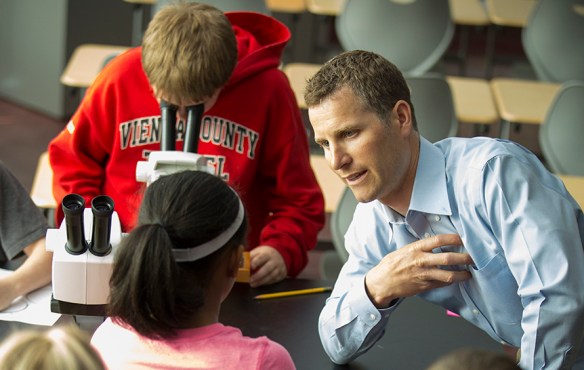By Phil Petru, Assistant Head of School, The Langley School
The Langley School teachers have long been recognized as one of the best and most respected faculties in the Northern Virginia region. Research suggests that the single most important factor in student achievement is the quality of a student’s teacher. Thus, the recruiting and hiring process is taken very seriously when any opening occurs at Langley.
But just as important as hiring is the school’s commitment to develop teachers’ instructional and curricular knowledge and abilities. Langley invests heavily in the continuing professional development of our teachers as faculty attend national and regional conferences about the best practices surrounding their respective fields. While professional development is an important cornerstone of maintaining and growing a strong faculty, so is the evaluation model that a school uses to provide meaningful feedback about teaching and learning.
Starting this school year, The Langley School faculty are engaging in a new teacher evaluation system designed to provide more timely and meaningful feedback to teachers about their instructional practices in the classroom. After spending the last school year examining the previous system and exploring other models for teacher evaluation, the Langley Academic Leadership Team (ALT) instituted a new system, the Marshall Observation Method, which is based on the work and research of Kim Marshall. Mr. Marshall, a lifelong educator who resides in the Boston area, is nationally renowned for his work in teacher evaluation and feedback. Langley’s ALT worked with about 25 faculty members during the 2015-2016 school year who volunteered to pilot two potential models of evaluation and feedback before the final decision was made to implement the Marshall Method.
Under the new Marshall evaluation system, members of Langley’s ALT visit each faculty member at least eight times throughout the school year for short, focused observations. Following each classroom visit, the teacher and ALT member reflect on the areas of strength and growth of the lesson. The ALT member writes a summary of the post-observation conference, along with any recommendations, and sends it to the teacher for his/her review. Each teacher also meets with his or her supervising ALT member in January and May for a mid- and final-year conference to discuss professional growth. Research shows that more meaningful and frequent feedback about instruction results in more observable growth of teachers.
Feedback from Langley’s faculty is very positive. Ryan McKinney, Lower and Middle School science teacher and Science Department head, remarked, “As teachers, we know that teachable moments lead to authentic learning experiences that help students grow. Implementing the Marshall Method at Langley provides more of an opportunity for teachers and administrators to experience and reflect on events that happen between students and teachers in the classroom. These ‘teachable moments’ are used to help start the collaborative process of developing strategies that improve teacher performance. In the end, it is a win for the administrator, teacher, and most importantly, the students.”
Devon Davidson, grade 5 teacher, was also impressed with the new process for teacher evaluation as she stated, “I think the Marshall observations allow for more holistic and realistic observations. The regularity of having someone come into my room, and not just once a year at the end of the year, gave the observer and me the chance to examine my teaching and the students in a realistic manner. The observers see authentic moments in our room which help develop relevant and applicable feedback. I appreciate that the post-observation meetings are short, and are more of a conversation rather than an assessment of my performance. One of the things I find most helpful in our post-observation conversations are the immediately applicable suggestions. Throughout the year, we get into our routines and sometimes forget about ideas or strategies that could be effective for our students. The post-observation conversations I have had always spark an idea to refresh what I do in the classroom.”
We are very proud of the impact that this model is having on our already vibrant teacher culture and community, and most importantly, our students’ learning. We hope you’ll reach out to learn more about our program.



Very grateful for the Langley School and their constant quest to always deliver the best education.